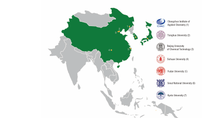Academic community and the cultivation of innovative talents
“The close Cooperation between universities and innovation- oriented enterprises helps to improve innovative awareness and action of talents, broadening their horizon.”
Prof. Shen Wei, Deputy Secretary of CPC Committee, East China University of Science and Technology
The concept of “Academic Community” was put forward by British philosopher Polanyi in the 20th Century, who deemed all scientists engaged in scientific research as a social group with common beliefs, values and norms. Colleges and universities, as cradles of talent and research institutions of various subjects, constitute the cornerstone of academic community. Enterprises, in contrast, understand market needs and lead innovative solutions, bringing momentum to this group.
In addition to a mission of scientific and technical innovation, the academic community has played a critical role in nurturing innovation talents. The close cooperation between universities and innovation-oriented enterprises helps to improve innovative awareness of talents, broadening their horizon.
Innovation-oriented education is deeply integrated in the curriculum and extra- curricular activities at East China University of Science and Technology (ECUST). The school, in Shanghai’s Xuhui District, features 19 lab buildings which are more than twice as classroom buildings with an aim of encouraging students to become involved in engineering training and operations.
Each year, the University Student Research Program (USRP) launches more than 500 extra-curricular research plans in which more than 2,000 juniors are engaged in practical research under the guidance of their instructors. Many of the results from the program are turned into innovative products and solutions. The Excellent Engineer Program also provides great opportunities for undergraduates and postgraduates to participate in external study and practice, in which they will be required to complete their dissertations at enterprises.
Both programs aim to nurture innovative and practical engineering talents. Over the years, the conversion rate of scientific achievements at ECUST is more than 50%, one of the highest among universities in China.
For more than a decade, innovative and socially responsible enterprises have been vigorously supporting the school in talent cultivation, BASF among them. Since the establishment of its first ECUST scholarship in 1997, BASF has witnessed the development of the school’s scientific research capacity and the growth in innovative talents. Just over 400 undergraduates and postgraduates have received BASF scholarships, with 24 students invited to the BASF Greater China Industry Summer Course to experience the Verbund concept in person. This year, Dr. Grigorious Kolios from BASF opened at the School of Chemical Engineering “Renewable Fixed Bed Reactor” course for postgraduate students. He placed great emphasis on safety regulations overlooked in standard university courses, helping to improve the safety awareness of our students.
With such frequent exchanges, BASF scientists have not only brought innovation concepts to our students and teachers, but also helped them understand the significance of chemistry in the development of human race and future life, that the momentum of today’s research is derived from future needs. The diversified information and viewpoints from the enterprise has made the university truly inclusive and inspiring.
Nowadays, mobile phones offer a convenient way to connect university professors, enterprise R&D leaders and institutional scientists. For example, we often discuss research subjects and seek Cooperation in WeChat groups. Emerging media not only facilitates communication in the academic community but also creates many innovative ways of Cooperation, helping to motivate and inspire students and teachers in research and innovation.
